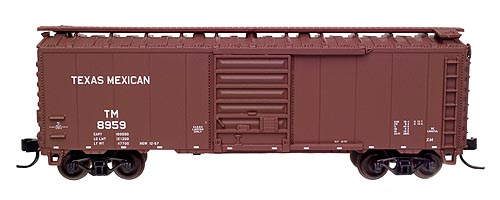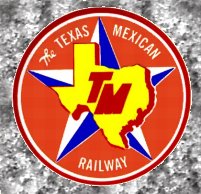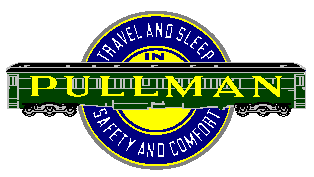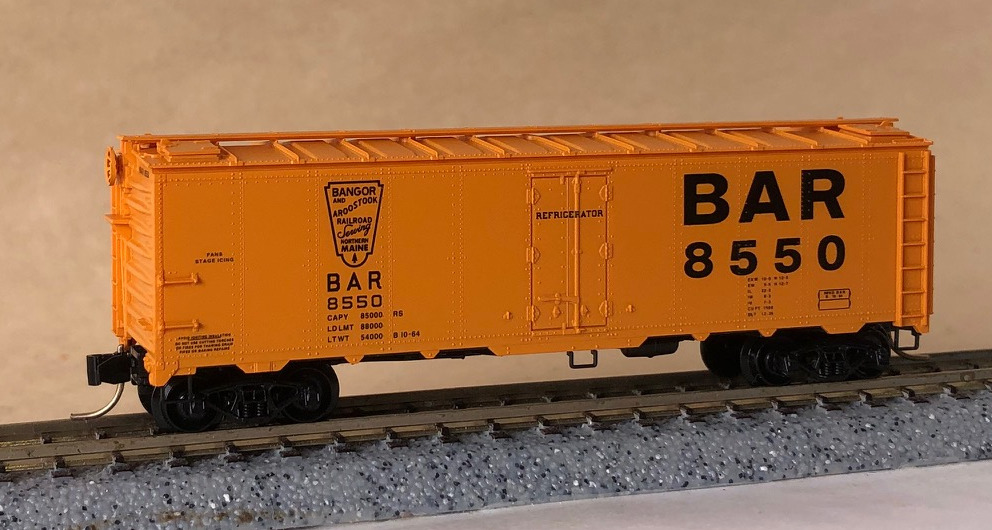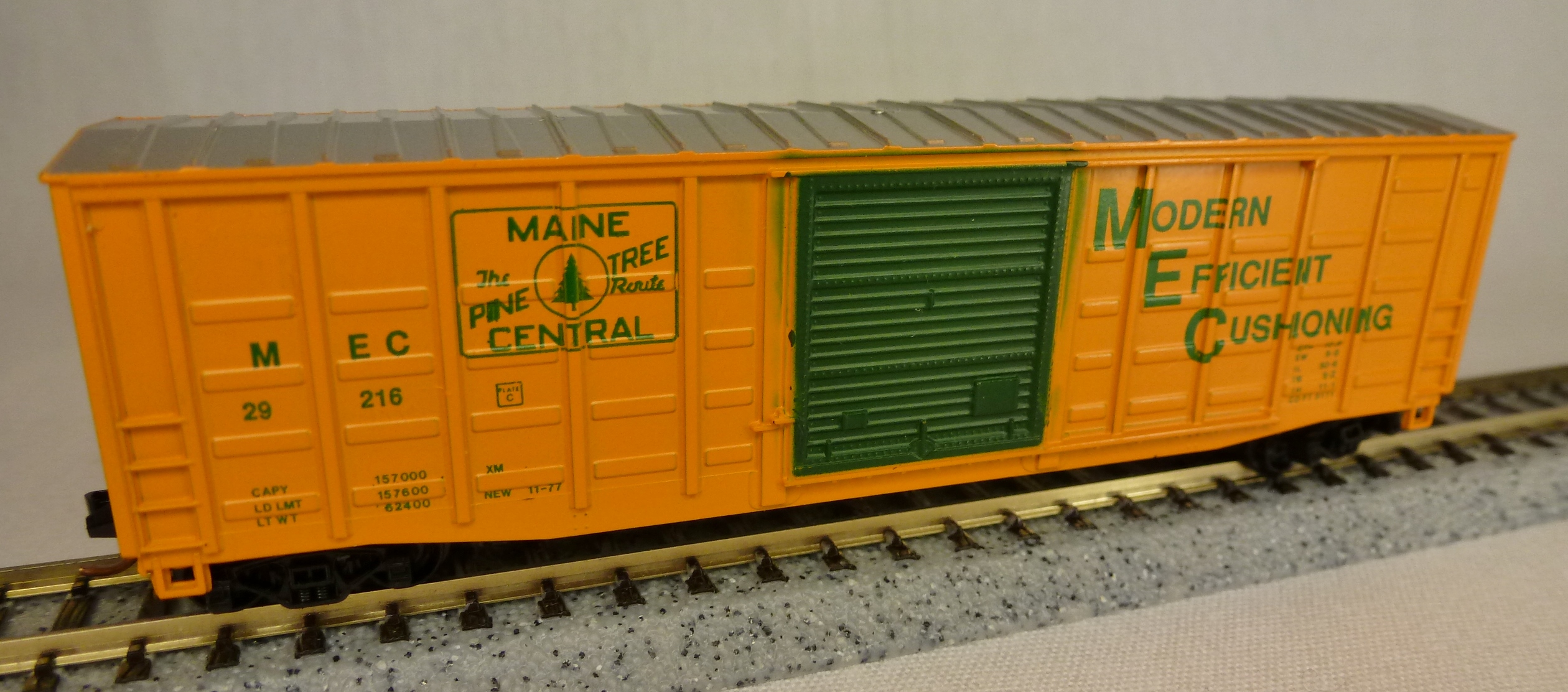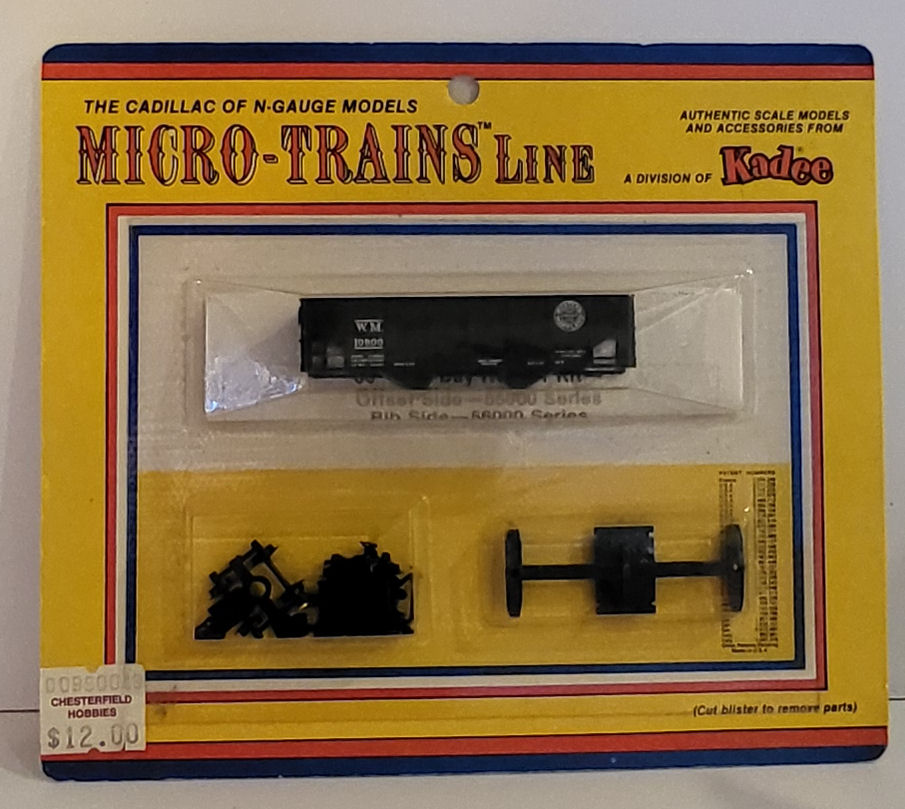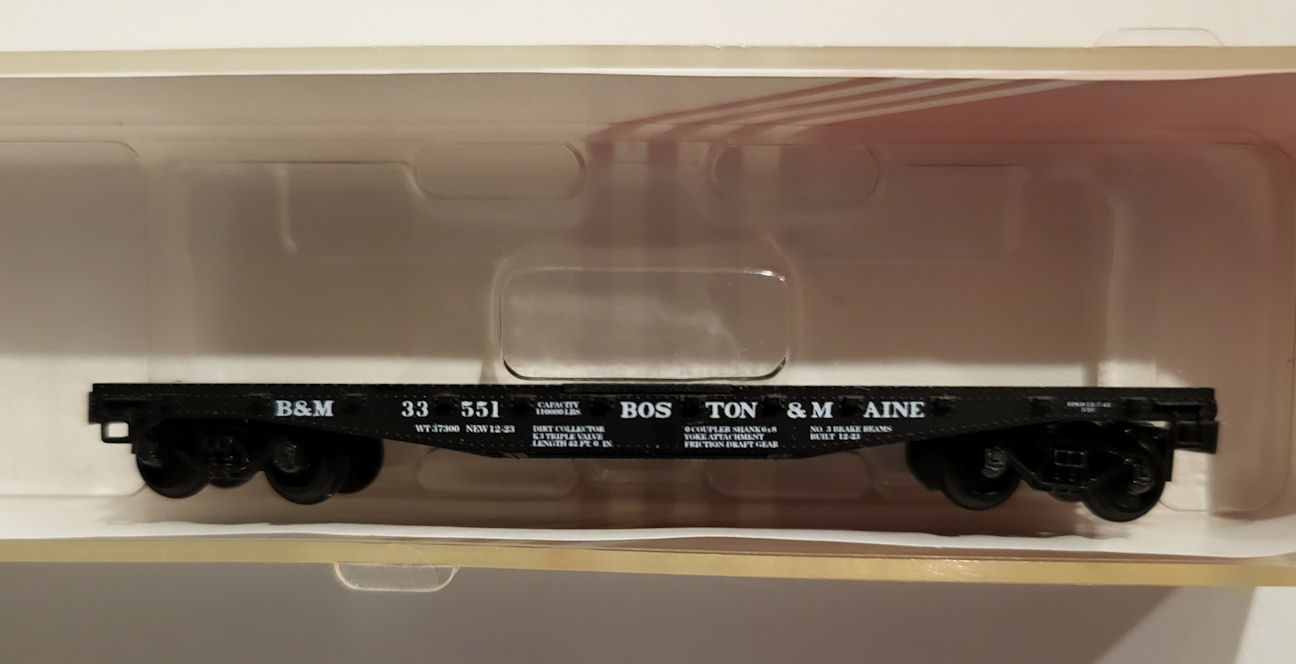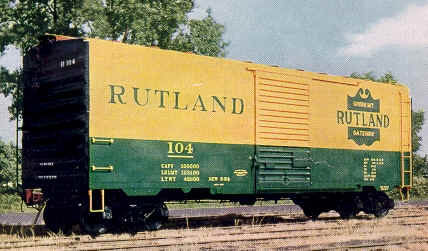Model Information: This tooling was introduced by Atlas in 1976. It replaced the earlier (and very similar) model from Roco of Austria that had been imported by Atlas from 1967 until 1975. Initial production was at the New Jersey factory. Production was later moved to China. As of 2017, this model is now very long in the tooth, so recent releases have been classified as 'Trainman' (budget) product line. Newer versions come equipped with Accumate couplers. This model should not be confused with the much newer 'Master' PS-1 boxcar from Atlas which is a completely different tooling.
Similar to other Atlas models of the 1970s and 1980s, this tooling originally featured Rapido Couplers and deep-flange nickel-silver plated wheels. When production moved to China, they started appearing with plastic low-profile wheels and Accumate couplers.
Sometime after 2005, Atlas created a 'Master' version of this model, and downgraded this tooling to the "Trainman" line. The new tooling was a complete redo of the model and has body mounted couplers, metallic wheels and excellent detailing, especially of the underframe. Since these are also marketed as 'PS-1' boxcars, it can be confusing. That tooling, however is different enough that we associate those cars with a different body style.
Similar to other Atlas models of the 1970s and 1980s, this tooling originally featured Rapido Couplers and deep-flange nickel-silver plated wheels. When production moved to China, they started appearing with plastic low-profile wheels and Accumate couplers.
Sometime after 2005, Atlas created a 'Master' version of this model, and downgraded this tooling to the "Trainman" line. The new tooling was a complete redo of the model and has body mounted couplers, metallic wheels and excellent detailing, especially of the underframe. Since these are also marketed as 'PS-1' boxcars, it can be confusing. That tooling, however is different enough that we associate those cars with a different body style.
Prototype History: The 40' Boxcar is widely known as one of the most popular freight cars used by railroads as they transitioned from steam to diesel. In particular the Pullman Standard or PS-1 design was one of the most popular and was widely used by North American railroads. These boxcars were built beginning in 1947 and share the same basic design, with certain elements such as door size, door style or roof type varying among the different railroads and production years. When production of these cars ceased in 1963, over 100,000 had been produced.
So just what is a PS-1? Well the simple answer is it is any boxcar built by Pullman Standard from 1947 on. The design changed over the years – sometimes subtly, sometimes for customer request, and sometimes in a larger way. In general, most PS-1’s built from 1947 to 1961 share the same dimensions and basic construction techniques. These cars all had a length of 40′, a height of 10’5″ or 10’6″, welded sides and ends and roof of Pullman’s own design. The greatest variation was in the size and style of doors used. Pullman Standard also offered 50′ and later 60′ boxcars – also with the PS-1 designation.
So just what is a PS-1? Well the simple answer is it is any boxcar built by Pullman Standard from 1947 on. The design changed over the years – sometimes subtly, sometimes for customer request, and sometimes in a larger way. In general, most PS-1’s built from 1947 to 1961 share the same dimensions and basic construction techniques. These cars all had a length of 40′, a height of 10’5″ or 10’6″, welded sides and ends and roof of Pullman’s own design. The greatest variation was in the size and style of doors used. Pullman Standard also offered 50′ and later 60′ boxcars – also with the PS-1 designation.
Road Name History: The Texas Mexican name first appeared in 1881 during a reorganization of a previous three foot gauge line linking the Gulf port of Corpus Christi, Texas and the city of Loredo on the Mexican border. The line was 157 miles long putting it between Spokane International and Duluth Winnipeg & Pacific in relative size. The TM was standard-gauged in 1902.
Since 1900, TM was owned by the Mexican government through a trust administered in New York. The TM acted as a funnel for traffic to and from Mexico, in fact the end of the line was half way across a bridge over the Rio Grande west of Loredo. The bridge, which was completed in 1883 was the first direct railroad connection between the U.S.A. and another country (the first connection to Canada that didn’t involve a ferry followed six years later!)
TM completely dieselized in 1939 with a fleet of 7 Whitcomb boxcabs. These strange little diesels had four axels set in a rigid frame. That sounds a little, well rigid, by diesel standards but think of it as a diesel powered 0-8-0. A few years later, TM built a few diesels themselves with 4 powered axels in a rigid frame plus a pair of un-powered leading wheels – essentially a diesel 2-8-0. They even built another diesel from an old baggage car.
TM did go on to buy more sensible locomotives including Baldwin switchers, EMD F7’s, and 7, 9, 18, 28, and 38 series geeps. By the 1980’s, there were 16 various geeps on the roster. For a while in the 1980s, TM provided passenger service under the name TexMex Express between Corpus Christi and Loredo with some success.
In 1982, the Mexican government sold their stake in TM to a Mexican company. As the privatization of the Mexican National Railways (FNM) loomed, Kansas City Southern was assembling a system to take advantage of new traffic moving north and south due to the passage of the NAFTA treaty. KCS was positioning itself to acquire a large stake in the “Northeast Concession” (that would become TFM) in the privatization of FNM. Over a period of several years, shares in Texas Mexican were traded back and forth between KCS and companies in Mexico. KCS officially took control of TM in 2005 when they also purchased all remaining shares of TFM. That left a gap between Corpus Christi and the end of the KCS at Beaumont, Texas. KCS had already leveraged trackage rights over Union Pacific to bridge that gap in exchange for not fighting UP’s acquisition of Southern Pacific. Today, TM is a wholly owned subsidiary of KCS and operations are largely integrated into those of KCS.
Since 1900, TM was owned by the Mexican government through a trust administered in New York. The TM acted as a funnel for traffic to and from Mexico, in fact the end of the line was half way across a bridge over the Rio Grande west of Loredo. The bridge, which was completed in 1883 was the first direct railroad connection between the U.S.A. and another country (the first connection to Canada that didn’t involve a ferry followed six years later!)
TM completely dieselized in 1939 with a fleet of 7 Whitcomb boxcabs. These strange little diesels had four axels set in a rigid frame. That sounds a little, well rigid, by diesel standards but think of it as a diesel powered 0-8-0. A few years later, TM built a few diesels themselves with 4 powered axels in a rigid frame plus a pair of un-powered leading wheels – essentially a diesel 2-8-0. They even built another diesel from an old baggage car.
TM did go on to buy more sensible locomotives including Baldwin switchers, EMD F7’s, and 7, 9, 18, 28, and 38 series geeps. By the 1980’s, there were 16 various geeps on the roster. For a while in the 1980s, TM provided passenger service under the name TexMex Express between Corpus Christi and Loredo with some success.
In 1982, the Mexican government sold their stake in TM to a Mexican company. As the privatization of the Mexican National Railways (FNM) loomed, Kansas City Southern was assembling a system to take advantage of new traffic moving north and south due to the passage of the NAFTA treaty. KCS was positioning itself to acquire a large stake in the “Northeast Concession” (that would become TFM) in the privatization of FNM. Over a period of several years, shares in Texas Mexican were traded back and forth between KCS and companies in Mexico. KCS officially took control of TM in 2005 when they also purchased all remaining shares of TFM. That left a gap between Corpus Christi and the end of the KCS at Beaumont, Texas. KCS had already leveraged trackage rights over Union Pacific to bridge that gap in exchange for not fighting UP’s acquisition of Southern Pacific. Today, TM is a wholly owned subsidiary of KCS and operations are largely integrated into those of KCS.
Brand/Importer Information: In 1924 Stephan Schaffan, Sr. founded the Atlas Tool Company in Newark, New Jersey. In 1933 his son, Stephan Schaffan, Jr., came to work for his father at the age of sixteen. Steve Jr. built model airplanes as a hobby and frequented a local hobby shop. Being an enterprising young man, he would often ask the owner if there was anything he could do to earn some extra spending money. Tired of listening to his requests, the hobby-store owner threw some model railroad track parts his way and said, "Here, see if you can improve on this".
In those days, railroad modelers had to assemble and build everything from scratch. Steve Jr. created a "switch kit" which sold so well, that the entire family worked on them in the basement at night, while doing business as usual in the machine shop during the day.
Subsequently, Steve Jr. engineered the stapling of rail to fiber track, along with inventing the first practical rail joiner and pre-assembled turnouts and flexible track. All of these products, and more, helped to popularize model railroading and assisted in the creation of a mass-market hobby. The budding entrepreneur quickly outgrew the limitations of a basement and small garage operation. Realizing they could actually make a living selling track and related products, Steve and his father had the first factory built in Hillside, New Jersey at 413 Florence Avenue in 1947. On September 30, 1949, the Atlas Tool Company was officially incorporated as a New Jersey company.
In 1985, Steve was honored posthumously for his inventions by the Model Railroad Industry Association and was inducted into the Model Railroad Industry Hall of Fame in Baltimore, Maryland. In addition, Steve was nominated and entered into the National Model Railroad Association Pioneers of Model Railroading in 1995.
In the early 1990s, the Atlas Tool Company changed its name to Atlas Model Railroad Company, Inc.
In those days, railroad modelers had to assemble and build everything from scratch. Steve Jr. created a "switch kit" which sold so well, that the entire family worked on them in the basement at night, while doing business as usual in the machine shop during the day.
Subsequently, Steve Jr. engineered the stapling of rail to fiber track, along with inventing the first practical rail joiner and pre-assembled turnouts and flexible track. All of these products, and more, helped to popularize model railroading and assisted in the creation of a mass-market hobby. The budding entrepreneur quickly outgrew the limitations of a basement and small garage operation. Realizing they could actually make a living selling track and related products, Steve and his father had the first factory built in Hillside, New Jersey at 413 Florence Avenue in 1947. On September 30, 1949, the Atlas Tool Company was officially incorporated as a New Jersey company.
In 1985, Steve was honored posthumously for his inventions by the Model Railroad Industry Association and was inducted into the Model Railroad Industry Hall of Fame in Baltimore, Maryland. In addition, Steve was nominated and entered into the National Model Railroad Association Pioneers of Model Railroading in 1995.
In the early 1990s, the Atlas Tool Company changed its name to Atlas Model Railroad Company, Inc.
Item created by: Emily on 2016-10-16 17:03:11. Last edited by gdm on 2020-06-05 11:47:57
If you see errors or missing data in this entry, please feel free to log in and edit it. Anyone with a Gmail account can log in instantly.
If you see errors or missing data in this entry, please feel free to log in and edit it. Anyone with a Gmail account can log in instantly.


